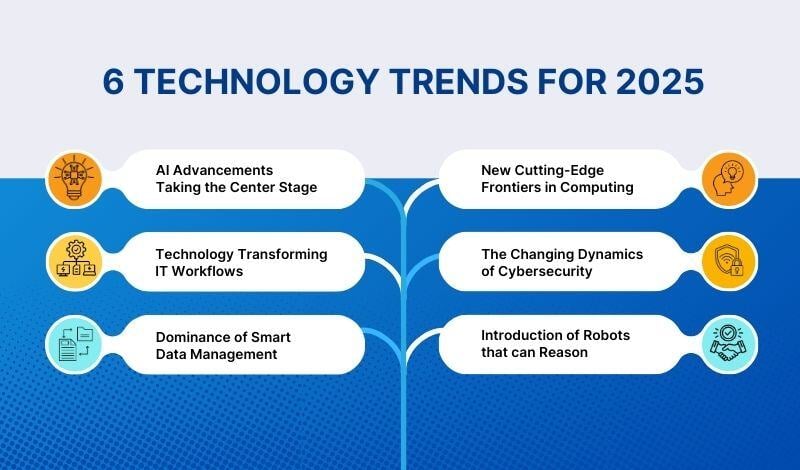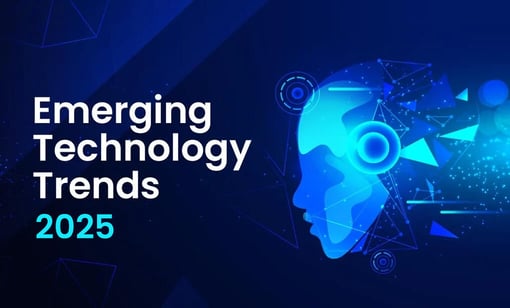The year 2025 has been a tipping point of strategic technology investments leading to a surge in digital transformation and business process automation. CEOs, CTOs and IT decision-makers are pushing their financial workflows to accommodate AI advancements, innovations in computing, and human-machine collaboration.
According to Statista, a global data and business intelligence platform, the global IT investments are about to reach a whopping $5.6 trillion by 2025. This spending dynamics is projected to amplify further as 64% of technology companies in Europe and North America intend to increase their IT budgets.
In this fast-paced and ever-evolving business landscape, startups and emerging organizations need to capitalize on bigger business opportunities. Clarion’s technology trends 2025 list is a roadmap to create next-gen technology breakthroughs, balance innovation with data-driven strategies, and maximize profitability like never before.
6 Game-Changing Technology Trends to Dominate 2025
Check out the latest trends that are revolutionizing the global technology space in 2025 and beyond. These innovations and advancements are the catalysts for IT leaders looking to strategize technology investments, future-proof data management, and make better business decisions.

-
AI Advancements Taking the Center Stage
The first and most significant technology trend for 2025 is the advancements happening in AI. Agentic AI has become more than just a buzzword. Small businesses can now create intellgient software capable of taking decisions autonomously.
As per Gartner, an American technological research and consulting firm, Agentic AI will automate decision-making for 15% of day-to-day operations by 2028. A practical example of this automation is Microsoft’s Magentic-One. It is an open-source multi-agent framework backed by specialized AI agents. It improves productivity in daily tasks like data analysis and retrieval.
Another report by Capgemini, a French multinational IT services and consulting company, suggests that 85% of investors and 70% of executives consider AI agents as one of the impactful technologies for 2025. The report also states that 82% of companies plan to implement AI agents in next three years to automate mundane operations and enhance efficiency.
The year 2025 is witnessing a more focused approach toward custom AI models. Small and medium-sized businesses (SMBs) in the North America need to decide whether they need to invest in private or open-source models. On the other hand, GenAI-based software products are changing the way businesses operate. GenAI systems powered by machine learning (ML) algorithms play a vital role in micro-automations with human in the loop. Some practical examples include the following:
- Software code generation and optimization
- Faster document processing and management
- Automated IT ticket tracking and resolution
- Proactive incident analysis and management
- Natural language-based customer support
AI integration across industries is becoming indispensable. SMBs need to take stringent actions for ethical and responsible use of AI technologies. A stronger hold over AI Trust, Risk, and Security Management (AI TRiSM) is essential to ensure bias detection, accountability, multilayered authentication, AI governance, and disinformation security.
-
New Cutting-Edge Frontiers in Computing
One of the most important technology trends in 2025 is how computing is changing for better business outcomes. Organizations are moving toward post-quantum cryptography (PQC) where cryptographic methodologies act as a shield to avoid quantum computing (QC) decryption issues. A research by Gartner states that advances in quantum computing will make most conventional asymmetric cryptography unsafe to use by 2029.
Another advancement gaining traction is ambient invisible intelligence. It refers to the increasing use of affordable tags and sensors for real-time tracking and reporting of history, identity, and other assets. This trend is transforming supply chains at scale with improved products and processes backed by AI and analytics. Some realistic examples include:
- Behavior-based customer recommendations in retail.
- Automated workplace modifications based on employees use.
- Continuous patient monitoring via wearables in healthcare.
Startups and emerging organizations are focusing on reducing carbon footprint and energy consumption. That’s where energy-efficient computing is playing its part to improve sustainability across IT and financial services. In the next 5 – 10 years, organizations will experience considerable energy-efficient profits through sustainable architecture, systems running on renewable resources, and efficient code and algorithms.
Hybrid computing is also on the rise! A combination of computing technologies, such as photonic, quantum, and photonic systems, edge devices, ASICs (Application-Specific Integrated Circuits), Central Processing Units (CPUs), and Graphics Processing Unit (GPUs) is here to resolve critical pain points in computing. Focusing on enhanced automation, this trend can create cloud-based environments to improve scalability, increase data security, and fast-track production scenarios.
The perfect example of human-machine collaboration is spatial computing. Using technologies like augmented reality (AR), virtual reality (VR), and AI, this trend is offering immersive user experiences to bring the best of physical and digital worlds. Gartner states that, by 2033, the spatial computing market size is about to reach $1.7 trillion with involvement of major players like Qualcomm and Nvidia.
-
Technology Transforming IT Workflows
Another major technology trend for 2025 is focused on the how technology is changing the way IT operations are executed. This trend highlights organizational understanding of investing in the right technologies and its impact on business outcomes in the longer run.
As per Deloitte, an industry-leading audit, consulting, tax, and advisory services provider, IT leaders plan to transform multiple work areas using AI in the next two years. The prime IT areas that will witness widespread adoption are infrastructure, cloud-based financial operations (FinOps), talent, engineering, and cyber risk. Moreover, most companies’ digital products or software footprints will accommodate GenAI capabilities by 2027.
As such, businesses need to shift from manual code writing and traditional software development. They need to emphasize on automated code generation and review, architecture mapping, and functional orchestration. A real-world example of this approach is Google, where developers are provided by AI tools internally. “AI is used to develop 2.5% of the new code at the technology giant,” said CEO Sundar Pichai in an earnings call.
In the talent domain, automated skills gap analysis is already creating personalized learning and development content to upskill employees across the globe. Whereas, the cloud FinOps is witnessing optimization of IT budgets at a greater speed with enhanced resourced allocation, pattern recognition, and cost analysis using AI. SMBs can leverage IT outsourcing ROI Calculator to evaluate their IT requirements and maximize technology investments in 2025.
On the contrary, IT infrastructure tasks like manual resolution of security issues and service management is about to change. Automated anomaly detection and predictive maintenance will take precedence. Cybersecurity response optimization will add more value with AI-powered incident response mechanisms and data masking systems.
-
The Changing Dynamics of Cybersecurity
Our list of technology trends 2025 will be incomplete without mentioning how cybersecurity is going beyond a set paradigm. With increasing frequency of cyber threats across organizations, IT leaders need to make strategic investments in next-gen security solutions backed by AI.
Capgemini states that industry executives consider AI and GenAI in cybersecurity as the top technology trend of 2025 in more than sixty trends. Furthermore, 75% of executives say their companies are about to implement AI/GenAI in cybersecurity in 2025. These statistics are enough to highlight the growing importance of technology in safeguarding digital infrastructure.
The cybersecurity domain will experience an addition of new capabilities powered by the latest AI technologies.
- Botnet detection and mitigation
- Deepfake detection and analysis
- Behavioral biometrics technology
- Bias detection and elimination
- Threat identification and resolution
- Vulnerability and fraud discovery
In 2025, businesses need to adopt advanced defensive cybersecurity systems that can trick hackers, malicious bots, and unauthorized activities. Security teams need to utilize the capabilities of technology to simulate realistic attack scenarios, synthetic content, data anomalies, privacy breaches. For example, organizations such as Darktrace are simulating actual attack scenarios using AI to discover and resolve critical vulnerabilities faster.
-
Smart Data Management Will Continue its Dominance
Having a data-driven strategy was a big highlight last year. In 2025, smart data management for improved business outcomes will continue to be amongst the most influential information technology trends. Why? Because data is a key asset for companies looking to build future-ready workplaces. McKinsey, an American multinational strategy and management consulting firm, predicts that workforces across the globe will leverage data on regular basis to support their daily work by 2025.
With growing AI implementation, companies can revolutionize data gathering and analysis to create impeccable software products. They can create agile workplaces driven by seamless employee, customer, and partner experiences. Moreover, IT leaders can invest in cloud-based data operations (DataOps) to decrease the cost and time of executing innovative AI capabilities.
Undoubtedly, intelligent data management has become a priority rather than a choice. As such, startups, SMBs, and enterprises need to adopt the top data management tools, such as:
- Microsoft Power BI for data visualization
- Python libraries for advanced data analysis
- Microsoft Azure for error-free data lineage
-
Introduction of Robots that can Reason
Robots built on top of foundational models are one of the critical technology trends to follow in 2025. Previously driven by a single-purpose, today, robots are making a smooth transition toward versatile machines with powerful reasoning capabilities. All thanks to the flexibility and predictive intelligence of small language models (SLMs), large language models (LLMs), and visual language models (VLMs).
Robots like humanoids, virtual assistants, and collaborative robots (cobots) are about to instill even greater synergy between humans and machines. They will empower every industry to supercharge physical operations and digital workflows. What’s more important is that this revolution will establish new technology environments that can ‘think and react’ to resolve hiccups autonomously.
According to McKinsey, 80% executives see natural language communication as a bridge to improve human-robot collaboration and trust. Moreover, 70% executives feel that their companies are optimistic about intelligent robots. A renowned example is Tesla’s Optimus, which is building machines that collaborate with humans with utmost ease.
Another report by Capgemini shed light on the growing importance of AI-powered robots, cobots, agility robots. It suggests that these advancements will help nearly all industries amplify business productivity by:
- Introducing autonomous problem-solving mechanisms
- Personalizing customer experiences with efficacy at scale
- Handling complex tasks to reduce human efforts and time
- Streamlining collateral functions to support core capabilities
- Refining decision-making with data analysis in real-time
End Note
Adopting the new technology trends for 2025 is the key to aligning your business objectives with technology investments and user-centric innovation. It will help startups, SMBs, and enterprises build a scalable and forward-thinking strategy to embrace digital transformation, explore potential opportunities, and drive business revenue.
At Clarion Technologies, we always stay abreast with the top new technologies and potential trends. Our broad spectrum of advanced technology solutions has helped organizations exceed their business goals. We can assist you in implementing the best technologies that suit your requirements.
Author









